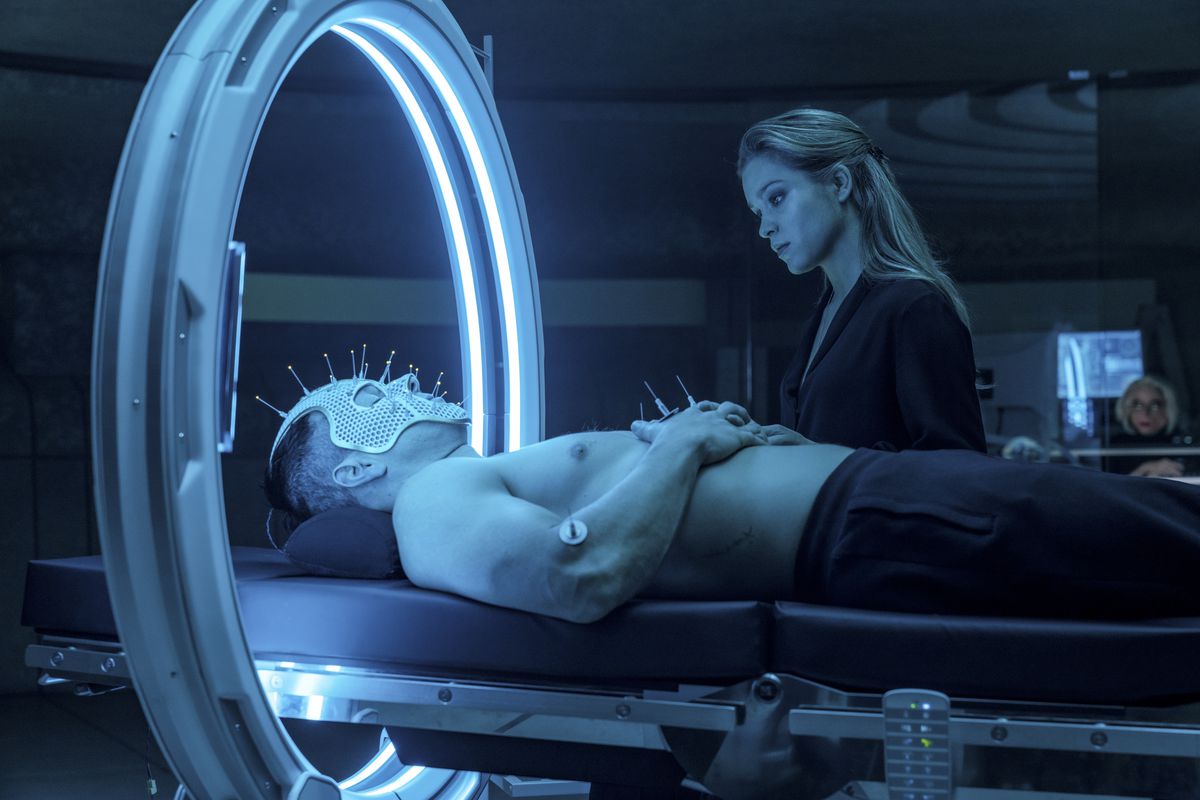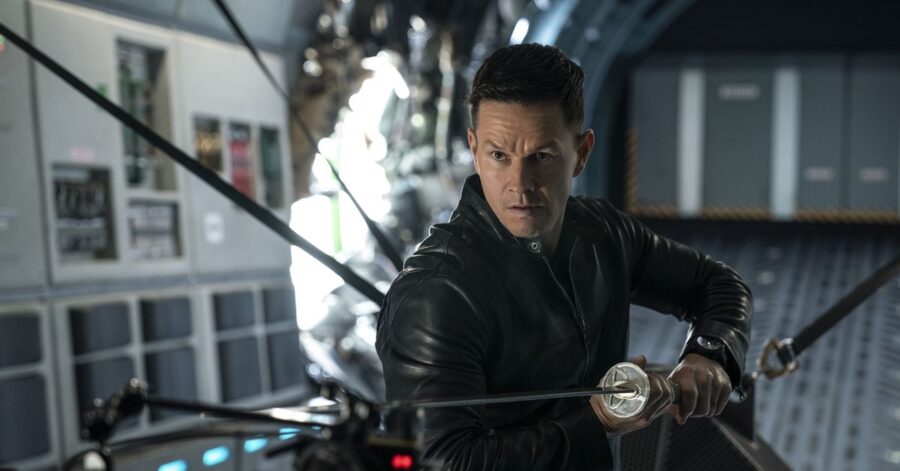It might be unfair to make blanket statements about an actor, their level of talent, their particular charisma, or the added value they bring to a project. But sometimes a movie is such a mess, and the star at its center so miscast, that broad generalizations must be made. So here goes. Mark Wahlberg should never be in a science fiction movie ever again. While the Paramount Plus exclusive streaming movie Infinite isn’t entirely his bad — the direction, script, and overall absence of creative vision also range from nonsensical to embarrassing — it suffers profoundly from his bland, phoned-in, looking-for-the-craft-table performance.
Did we learn nothing from Tim Burton’s Planet of the Apes or M. Night Shyamalan’s The Happening? Wahlberg is not an actor for this genre, although Infinite can barely be called a genre movie. Sure, it plays with better ideas yanked from various sci-fi movies, books, and TV series, including The Matrix, Altered Carbon, The Fifth Element, and Total Recall. And sure, it mimics the “special chosen one” format so familiar now for big-budget blockbusters like the Star Wars or Hunger Games franchises. Familiarity is not a fatal flaw on its own. But it can be when paired with all the other aspects of Infinite that lack a particular identity.
Director Antoine Fuqua Infinite’s production design is built on the warmed-up leftovers of The League of Extraordinary Gentlemen and the Underworld franchise. Its action scenes are as choppily edited and physically weightless as those in Michael Bay’s late-career oeuvre, á la 6 Underground. And its superficial understanding of the idea of reincarnation, along with its frankly bizarre treatment of Asian and Indigenous identities as disposable components of its white male protagonist’s self-actualization journey, all add up to an overall vibe that can be summed up as “Yikes.”

Photo: Peter Mountain/Paramount Plus
Set mostly in present-day New York City, Infinite follows diagnosed schizophrenic Evan McCauley (Mark Wahlberg), who since his teenage years has struggled with what he thinks are mental-health issues. He remembers memories that aren’t his own, and he dreams so vividly that he wakes up confused about what place and time he’s currently in. He takes an array of drugs to stay even-keeled. He has a strong moral compass and a tendency to defend people who need it. (All of Infinite’s women count as weaker-than characters who Evan needs to shelter from harm.) He seems to know an endless array of unexpected facts and trivia: “Homeboy knows everything. He a freak,” says one of his drug dealers.
That’s about all you’ll get to know about Evan before Infinite begins jumping back and forth, by means of flashing lights and fuzzy composition, between his current life and his past lives as Heinrich Treadway. In Evan’s most recent life in the 1980s (during which he’s played by Dylan O’Brien), Treadway fought his former ally Bathurst (played then by Rupert Friend), who developed an egg-shaped device that could kill all of humanity. (It doesn’t matter how the thing works; none of the details in Infinite make sense, so don’t overthink it.) In the 1980s, Treadway hid the egg somewhere, and although the current version of himself has no memory of that, Bathurst (now played by Chiwetel Ejiofor) is determined to get it out of him.
A typical moment of muddled story: A character tells Evan that Treadway was born in the 1750s. Another says he and Treadway served together in the Punic Wars between the Romans and Carthaginians. In flashback, we see Evan’s/Treadway’s prior lives as those aforementioned Japanese and Indigenous men. Japanese samurai, which Treadway is suggested to have been, were around from the 12th century until the caste’s dissolution in the 19th century, while we all know what happened to Indigenous Americans in the centuries after Christopher Columbus arrived in America in 1492. So when was Treadway actually born? In what order were these lives lived? His name was always “Heinrich”? Show us the math!
Anyway. Infinite progresses with Bathurst chasing Treadway while Evan is trying to remember that he even is Treadway, with the assistance of fellow Infinites Bryan (Toby Jones), Nora (Sophie Cookson), Kovic (Jóhannes Haukur Jóhannesson), Trace (Kae Alexander), and the Artisan (Jason Mantzoukas). They put him in an MRI-type machine to unlock his memories. They teach him how to fight. And they explain, at tedious length, their mission of saving humanity. Let’s be frank here, they all seem to be doing a terrible job of it! Like Thanos, Orm in Aquaman, or Alan Moore’s original version of Doctor Manhattan, Bathurst is disillusioned with humankind for being selfish, destructive, and short-sighted, and his exhaustion is entirely relatable!
There are some bright spots in this cast: O’Brien uses those Maze Runner action skills to believably wield a samurai sword, and when he leaps out of a crashing car toward a construction crane, that might be the movie’s sole exciting scene. Mantzoukas is doing what feels like a spin on his Tick Tock Man character from John Wick: Chapter 3 – Parabellum. But then there’s Wahlberg, dragging everything down with his dourness and flatness, and Cookson’s Nora is such a nonentity that she doesn’t make any kind of impression. The only scene that at least inspires absurdist delight comes when Jones’ Bryan, who has just been waterboarded with a jar of honey, and Ejiofor’s Bathurst, who just ordered that waterboarding after having waterboarded himself earlier in the film as a sort of strength training, scream into each other’s faces about whether people are worth protecting. Play this clip in the MOMA until the end of time, for it is art.
This (somewhat loose) adaptation of the 2009 novel The Reincarnationist Papers by D. Eric Maikranz was dumped by Paramount onto its streaming service, Paramount Plus, after initially moving around its 2024 theatrical release date because of the COVID-19 pandemic. Infinite is so drab and so visually uninteresting that nothing of value was lost by this change in release strategy. Slow-motion shots of CGI bullets, drifting cars, murderous drones, and Wahlberg’s perpetually furrowed brow look as generic on a home TV as on a theatrical-size screen. Whatever stylistic flair the Antoine Fuqua who made Training Day, King Arthur, and Southpaw once possessed has since curdled.

Photo: Peter Mountain/Paramount Plus
But perhaps no director could breathe life into a film with such an absolutely dire script, and with such a sloppily superficial sense of its own worldbuilding and interior mythology. Infinite feels like what we’d get if Ridley Scott had caved in to every meddling studio note for Blade Runner: all the extra narration, plus all the extra exposition, plus all the extra repetitive dialogue. It’s difficult to discern which element of Ian Shorr’s screenplay or Todd Stein’s story is the worst. Is it the freshman-philosophy fact that the immortal beings who are reincarnated into different bodies over and over again are divided into two warring factions called the “believers” and the “nihilists”? Is it that the movie plays totally straight that the “believer” Infinites really think they have made life on Earth better through their individual efforts over hundreds of years? (Patty Jenkins’ Wonder Woman and Gina Prince-Bythewood’s The Old Guard both did a better job of examining the grief, regret, and exhaustion immortal do-gooder characters might have at humanity’s lack of progress.)
Or is the most eye-rollingly trite part of this film the fact that the main good-guy “Infinites” are nearly exclusively white characters who lived prior lives as Asian and Indigenous people, who are all flattened down to characteristics that only highlight the utility of their bodies? The Japanese man who knows how to make and wield a samurai sword. The Indigenous man who knows how to fight. What memories did those characters provide someone like Treadway? What lived experiences would, say, Indigenous Americans who died out or were hunted down, give to the Infinites that expanded their perspectives, challenged their preconceived notions, or complicated their certainty that they could really build a better world with only a few hundred superpowered people? Infinite doesn’t touch any of that, but it does make sure to include a coda that shows another one of these white people being reborn as a Middle Eastern baby in a U.S.-occupied war zone. Let me repeat, yikes. “I’m not crazy, OK? Just misunderstood,” Wahlberg’s Evan says at one point. But a better explanation for Infinite would be inept.
Infinite releases exclusively to Paramount Plus on June 11.
Polygon – All
Source link
Related Post:
- Cross-platform sci-fi strategy Infinite Lagrange launches in new regions | Articles
- WHAT IS INFINITE LAGRANGE? – SCI-FI SPACE SIMULATION INTO THE UNKNOWN (Walkthrough Gameplay)
- Sci-fi strategy game Infinite Lagrange launches pre-registration in new countries | Articles
- Infinite Lagrange hands-on: is Netease’s latest sci-fi SLG as impressive as it seems? | Articles
- A twisted sci-fi adventure awaits in Beautiful Desolation, out tomorrow on PS4 – PlayStation.Blog
- Ready at Dawn’s Oculus-exclusive zero-gravity sci-fi sequel Lone Echo 2 out in August • Eurogamer.net
- Settlers review: A sci-fi movie questions a Martian colony, then falls apart
- Naked Singularity review: How do you mess up a John Boyega sci-fi heist movie?
- The Final Fantasy Pixel Remasters are a strong effort, but there’s room for improvement for the inevitable console ports
- Nintendo’s Business Remains Strong, But Is The Bloom Off Switch Lite? – Talking Point
